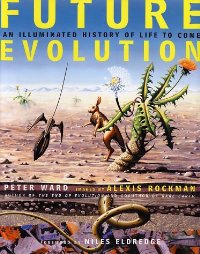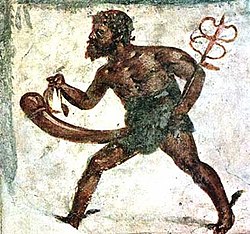Aristotle
Aristotle (/ˈærɪˌstɒtəl/; Greek: Ἀριστοτέλης, pronounced [aristotélɛːs], Aristotélēs; 384–322 BC) was an ancient Greek philosopher and scientist born in the city of Stagira, Chalkidice, on the northern periphery of Classical Greece. His father, Nicomachus, died when Aristotle was a child, whereafter Proxenus of Atarneus became his guardian. At seventeen or eighteen years of age, he joined Plato's Academy in Athens and remained there until the age of thirty-seven (c. 347 BC). His writings cover many subjects – including physics, biology, zoology, metaphysics, logic, ethics, aesthetics, poetry, theater, music, rhetoric, linguistics, politics and government – and constitute the first comprehensive system of Western philosophy. Shortly after Plato died, Aristotle left Athens and, at the request of Philip II of Macedon, tutored Alexander the Great beginning in 343 BC.

Future Evolution
Future Evolution is a book written by paleontologist Peter Ward and illustrated by Alexis Rockman. He addresses his own opinion of future evolution and compares it with Dougal Dixon's After Man: A Zoology of the Future and H. G. Wells's The Time Machine.
According to Ward, humanity may exist for a long time. Nevertheless, we are impacting our world. He splits his book in different chronologies, starting with the near future (the next 1,000 years). Humanity would be struggling to support a massive population of 11 billion. Global warming raises sea levels. The ozone layer weakens. Most of the available land is devoted to agriculture due to the demand for food. Despite all this, the oceanic wildlife remains untethered by most of these impacts, specifically the commercial farmed fish. This is, according to Ward, an era of extinction that would last about 10 million years (note that many human-caused extinctions have already occurred). After that, the world gets stranger.

Peter Douglas Ward
Peter Douglas Ward (born 1949) is an American paleontologist and professor at the University of Washington, Seattle, and Sprigg Institute of Geobiology at the University of Adelaide. He has written numerous popular science works for a general audience and is also an adviser to the Microbes Mind Forum.
Catharsis
Catharsis (from Greek κάθαρσις katharsis meaning "purification" or "cleansing") is the purification and purgation of emotions—especially pity and fear—through art or any extreme change in emotion that results in renewal and restoration. It is a metaphor originally used by Aristotle in the Poetics, comparing the effects of tragedy on the mind of a spectator to the effect of a cathartic on the body.
Classical unities
The classical unities, Aristotelian unities, or three unities are rules for drama derived from a passage in Aristotle's Poetics. In their neoclassical form they are as follows:
- unity of action: a play should have one action that it follows, with minimal subplots.
- unity of time: the action in a play should occur over a period of no more than 24 hours.
- unity of place: a play should exist in a single physical space and should not attempt to compress geography, nor should the stage represent more than one place
No harm done
—used to tell someone that no apology or concern is necessary because no damage has been done
It is all right. No one or nothing has been harmed. It's okay. No harm done. A: I am sorry I stepped on your toe. B: Noharm done.
Whalt Whitman
Walter "Walt" Whitman (/ˈhwɪtmən/; May 31, 1819 – March 26, 1892) was an American poet, essayist, and journalist. A humanist, he was a part of the transition between transcendentalism and realism, incorporating both views in his works. Whitman is among the most influential poets in the American canon, often called the father of free verse. His work was very controversial in its time, particularly his poetry collection Leaves of Grass, which was described as obscene for its overt sexuality.
Emily Dickinson
Emily Elizabeth Dickinson (December 10, 1830 – May 15, 1886) was an American poet. With the possible exception of Walt Whitman, Dickinson is now recognized as the most important American poet of the 19th century.
Dickinson was born in Amherst, Massachusetts. Although part of a prominent family with strong ties to its community, Dickinson lived much of her life in reclusive isolation. After studying at the Amherst Academy for seven years in her youth, she briefly attended the Mount Holyoke Female Seminary before returning to her family's house in Amherst. Considered an eccentric by locals, she developed a noted penchant for white clothing and became known for her reluctance to greet guests or, later in life, to even leave her bedroom. Dickinson never married, and most friendships between her and others depended entirely upon correspondence. Dickinson was a recluse for the later years of her life.
Free verse
Free verse is an open form of poetry. It does not use consistent meter patterns, rhyme, or any other musical pattern. Many poems composed in free verse thus tend to follow the rhythm of natural speech.

Oedipus
Oedipus (US /ˈidᵻpəs/ or /ˈɛdᵻpəs/ or UK /ˈiːdᵻpəs/; Ancient Greek: Οἰδίπους Oidípous meaning "swollen foot") was a mythical Greek king of Thebes. A tragic hero in Greek mythology, Oedipus accidentally fulfilled a prophecy that he would end up killing his father and marrying his mother, thereby bringing disaster to his city and family.
The story of Oedipus is the subject of Sophocles' tragedy Oedipus Rex, which was followed by Oedipus at Colonus and then Antigone. Together, these plays make up Sophocles' three Theban plays. Oedipus represents two enduring themes of Greek myth and drama: the flawed nature of humanity and an individual's role in the course of destiny in a harsh universe.

Phallus
A phallus is a penis, especially when erect, an object that resembles a penis, or a mimetic image of an erect penis.
Any object that symbolically—or, more precisely, iconically—resembles a penis may also be referred to as a phallus; however, such objects are more often referred to as being phallic (as in "phallic symbol"). Such symbols often represent fertility and cultural implications that are associated with the male sexual organ, as well as the male orgasm.

Dionysus
Dionysus (/daɪ.əˈnaɪsəs/; Greek: Διόνυσος, Dionysos) is the god of the grape harvest, winemaking and wine, of ritual madness, fertility, theatre and religious ecstasy in ancient Greek religion and myth. Wine played an important role in Greek culture, and the cult of Dionysus was the main religious focus for its unrestrained consumption He may have been worshipped as early as c. 1500–1100 BC by Mycenean Greeks; traces of Dionysian-type cult have also been found in ancient Minoan Crete. His origins are uncertain, and his cults took many forms; some are described by ancient sources as Thracian, others as Greek. In some cults, he arrives from the east, as an Asiatic foreigner; in others, from Ethiopia in the South. He is a god of epiphany, "the god that comes", and his "foreignness" as an arriving outsider-god may be inherent and essential to his cults. He is a major, popular figure of Greek mythology and religion, becoming increasingly important over time, and included in some lists of the twelve Olympians, as the last of their number, and the only god born from a mortal mother. His festivals were the driving force behind the development of Greek theatre.
Somewhere I Have Never Traveled
Somewhere I Have Never Traveled is a 2009 Taiwanese film about the lives of and relationship between two teens, a high school-aged boy and his younger niece. The movie begins by showing the nature of their relationship to each other, their family, and what makes them kindred spirits. It then jumps ahead about five years, when the boy discovers there is more to life than basketball and working in the family's candy store, but his niece is not so sure she likes the new complication.
website: https://www.youtube.com/watch?v=xnOtwN2lDN8
Drama
Drama is the specific mode of fiction represented in performance. The term comes from a Greek word meaning "action" (Classical Greek: δρᾶμα, drama), which is derived from "I do" (Classical Greek: δράω, drao). The two masks associated with drama represent the traditional generic division between comedy and tragedy. They are symbols of the ancient Greek Muses, Thalia, and Melpomene. Thalia was the Muse of comedy (the laughing face), while Melpomene was the Muse of tragedy (the weeping face). Considered as a genre of poetry in general, the dramatic mode has been contrasted with the epic and the lyrical modes ever since Aristotle's Poetics (c. 335 BCE)—the earliest work of dramatic theory.
Drama is often combined with music and dance: the drama in opera is generally sung throughout; musicals generally include both spoken dialogue and songs; and some forms of drama have incidental music or musical accompaniment underscoring the dialogue (melodrama and Japanese Nō, for example). Closet drama describes a form that is intended to be read, rather than performed. In improvisation, the drama does not pre-exist the moment of performance; performers devise a dramatic script spontaneously before an audience.
沒有留言:
張貼留言